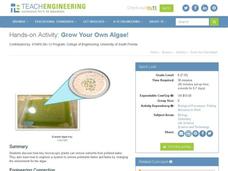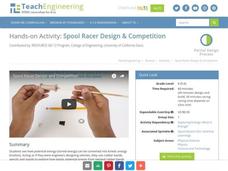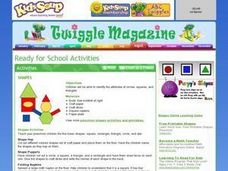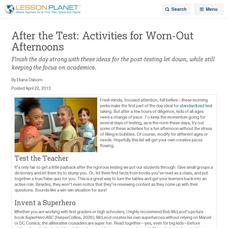Teach Engineering
Building a Barometer
Forget your local meteorologist — build your own barometer and keep track of the weather with an activity that provides directions to build a barometer out of a narrow necked bottle, a glass, and some water. Using their barometer,...
Teach Engineering
Design and Build a Rube Goldberg
Let's see how complicated we can make this simple task. The last activity associated with a 10-part series has groups design and build a Rube Goldberg machine. Teams determine a simple task to accomplish and use the engineering design...
Teach Engineering
Curb the Epidemic!
Class members use an applet on the Internet to simulate the spread of a disease. The simulation allows individuals to determine two nodes to vaccinate to limit the number of nodes infected. By running several simulations, scholars...
Teach Engineering
Bridge Types: Tensile and Compressive Forces
Bridges rely on tension and compression to keep them standing. Pairs test this principle by constructing simple bridges and applying a force to the center. Teams use the provided worksheet to record their observations of the...
Teach Engineering
Density Column Lab - Part 1
Mass and density — aren't they the same thing? This activity has groups use balance beams and water displacement to measure several objects. The pupils use the measurements to calculate the density of the objects.
Teach Engineering
Grow Your Own Algae!
Develop a model of a wastewater treatment center. The last activity of the unit has pupils mix a lake water sample into a tank of water containing fertilizers. Over time, the algae from the lake water grows and removes the nutrient-rich...
Teach Engineering
Seeing All Sides: Orthographic Drawing
How can your draw three-dimensional figures on paper? The lesson shows pupils how to draw orthographic projections of three-dimensional figures composed of cubes. After viewing a PowerPoint presentation, they practice this skill with...
Teach Engineering
Spool Racer Design and Competition
Wind it up and let it go. Individuals build a basic spool racer in the second portion of a six-part unit on energy. After receiving three criteria, pupils modify their designs to meet the new challenge. Pairs compete against each other...
Curated OER
Shapes Activities and Lessons
A fabulous lesson on identifying circles, triangles, squares, and rectangles awaits your students. They use large motor skills hopping from shape to shape, use visual and kinesthetic skills passing a ball of yarn between three people to...
Curated OER
Terrabagga Activity Using a Magnetometer
Clever! Earth science learners construct a model of a planet containing a magnetic core. The planet, Terrabagga, is made out of a paper grocery bag, magnets, a dead D battery, and rubber bands. Pictures of each step of the construction...
Teach Engineering
Energy Systems
Is electricity created in the outlet? Using posters of several energy systems, collaborative groups identify and describe the parts of their systems. The groups also look at the environmental impacts of the systems and present...
Curated OER
After the Test: Activities for Worn-Out Afternoons
Finish the day strong with these ideas for the post-testing let down, while still keeping the focus on academics.
Baylor College
Need or Want?
Even as adults it can be hard to distinguish needs from wants. Using pictures of common, everyday items, children make a pocket chart separating the objects they need from those that they want. Discuss their choices, explaining that...
NASA
Cosmic Microwave Background
Begin your next class with a BANG! Pupils discuss the formation of our universe and its expansion before proceeding with an activity designed to demonstrate what most likely occurred billions of years ago. They conclude with a discussion...
Herff Jones Education
Chemical Energy
Provide the class with a quick lesson on chemical energy as they are assisted in creating hot and cold packs to demonstrate energy transfer between objects. They observe the energy change in matter as it transforms and...
Teach Engineering
Who Can Make the Best Coordinate System?
Working with a map that does not have a coordinate system on it, small, collaborative teams must come up with a coordinate system for their map. Groups then explain their coordinate structure to the class.
Teach Engineering
What's Wrong with the Coordinates at the North Pole?
Here is an activity that merges technology with life skills as individuals use Google Earth to explore the differences between coordinate systems and map projections. The self-guided worksheet is the fourth segment in a nine-part unit....
Teach Engineering
Efficiency of an Electromechanical System
How efficient is a motor in a LEGO set? Future engineers conduct an activity where a LEGO motor-generator system raises an object to a specified height. They then show what they learned and use their measurements to calculate the energy...
Project Maths
Introduction to Probability
Take a chance with an activity sure to improve your class's skills. An introductory lesson focuses on probability and chance. It shows how probability is always a value between zero and one, i.e., the probability of an event is always...
BioEd Online
Arm Model
Arm your young scientists with knowledge about anatomy as they build their own model of the elbow joint. Help them get a firm grasp on how muscles and bones interact to allow movement as they try different positions for the muscles on...
Macmillan Education
Networking
"It's not what you know, it's who you know." Learners discuss and analyze this age-old adage by completing life skills worksheets, collaborative activities, and discussions regarding the nature of networking and how it may improve future...
Broward County Public Schools
Force and Motion
Get the ball rolling with this upper-elementary science unit on forces and motion. Offering over three weeks of physical science lessons, this resource is a great way to engage the class in learning about simple machines, friction,...
Joe Paprocki's Catechist's Journey
40 Ideas for 40 Days
From constructing a colorful paper chain for learners to keep track of their Lenten goals to baskets of plastic eggs filled with suggestions for observing Holy Week, here you'll find a variety of activities and ideas for...
American Chemical Society
The Ups and Downs of Thermometers
What has a thermometer earned that your pupils haven't? A degree! After reviewing the previous lessons about molecules and degrees, scholars observe how thermometers work before building their own. The module includes a activity sheet.
Other popular searches
- Reptiles Hands on Activities
- Hands on Activities Cells
- Grammar Hands on Activities
- Math Hands on Activities
- Mitosis Hands on Activities
- Hands on Activities of Heat
- Hands on Activities Dna
- Hands on Activities Respect
- Animal Hands on Activities
- Blending Hands on Activities
- Hands on Activities Patterns
- Hands on Activities Dna Rna

























